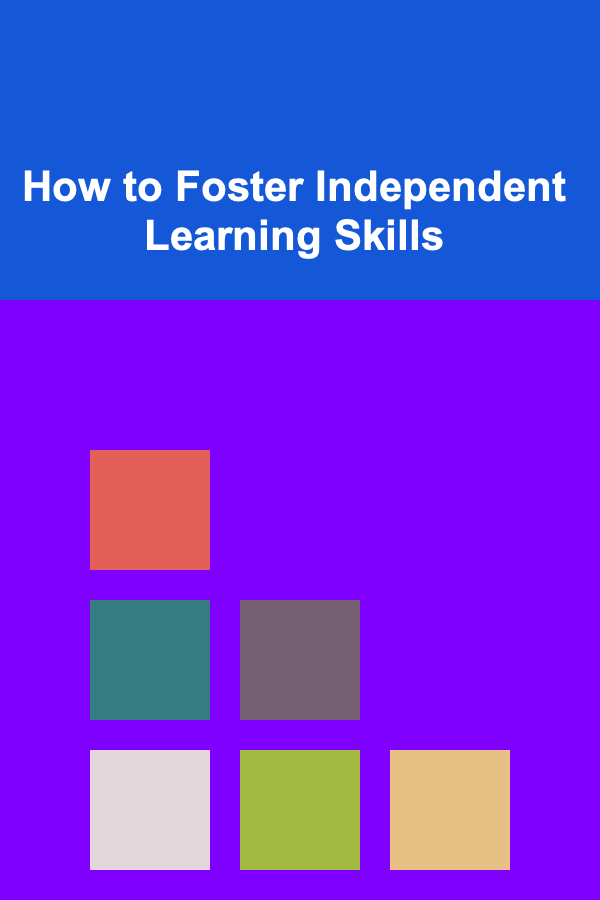
How to Foster Independent Learning Skills
ebook include PDF & Audio bundle (Micro Guide)
$12.99$11.99
Limited Time Offer! Order within the next:

In the age of information and rapid technological advancements, the ability to learn independently has become more crucial than ever. Independent learning not only empowers individuals to acquire new knowledge but also enables them to adapt to changing circumstances, solve problems creatively, and take ownership of their educational journey. Whether in formal education settings, professional development, or personal growth, fostering independent learning skills is essential for success.
This article delves into how to cultivate these skills in learners of all ages, exploring key strategies, practices, and tools that can help individuals become more self-sufficient and effective in their learning endeavors.
Understanding Independent Learning
Before diving into strategies, it's essential to define what independent learning truly means. Independent learning is the ability to take control of one's learning process, setting goals, managing time, and utilizing resources effectively without relying heavily on direct instruction from teachers or mentors.
Characteristics of an independent learner include:
- Self-motivation: The drive to learn without external pressures.
- Self-discipline: The ability to stay focused and organized.
- Critical thinking: The capacity to analyze information and think critically about various sources.
- Problem-solving: The ability to approach challenges with a solution-oriented mindset.
- Self-assessment: The ability to evaluate one's own understanding and progress.
Independent learners are active participants in their education, continuously setting personal goals, seeking out resources, and reflecting on their learning to improve over time.
The Importance of Independent Learning
In a rapidly changing world, the skills required to succeed are no longer solely acquired through traditional methods of learning. Independent learning encourages individuals to:
- Adapt to change: As new technologies and industries emerge, independent learners are better equipped to acquire the necessary skills to remain relevant.
- Promote lifelong learning: Independent learners are not restricted by the traditional academic calendar or school systems. They take ownership of their learning for life, continually pursuing knowledge beyond the classroom.
- Develop critical thinking skills: Independent learners must evaluate information and sources critically, strengthening their analytical thinking and decision-making abilities.
- Increase self-confidence: Successfully learning something independently can boost an individual's confidence, helping them believe in their ability to tackle challenges.
Fostering these skills in others, particularly young learners, helps build the foundation for lifelong education and personal growth.
Creating a Learning Environment that Promotes Independence
A key aspect of fostering independent learning is creating an environment where learners feel empowered to take control of their educational journey. This environment should encourage curiosity, self-exploration, and self-assessment. Here are some steps to create such an environment:
3.1 Encourage Curiosity and Exploration
Curiosity is the engine of independent learning. When learners are encouraged to ask questions and explore their interests, they take a more active role in their education. This requires a shift away from a traditional "teacher-centered" approach, where the teacher is the sole authority, and towards a more "learner-centered" approach, where students take initiative in their own learning.
3.2 Foster a Growth Mindset
A growth mindset is the belief that abilities and intelligence can be developed through hard work, perseverance, and learning from mistakes. Encouraging learners to adopt a growth mindset can significantly boost their willingness to tackle challenges and embrace the process of learning. A growth mindset also helps learners view failure as a part of the learning journey rather than something to be avoided.
3.3 Provide Access to Resources
To learn independently, learners need access to a range of resources, including books, articles, videos, online courses, and more. A supportive learning environment ensures that learners can easily access these resources and are guided in how to use them effectively.
3.4 Encourage Reflection
Reflection is a crucial component of independent learning. Learners who regularly reflect on their progress, challenges, and learning methods are better able to adjust their approach to achieve better outcomes. Reflection allows learners to identify what works for them, what doesn't, and how they can improve their learning strategies.
Developing Key Independent Learning Skills
Several key skills are necessary to become an effective independent learner. These include time management, self-regulation, research skills, and critical thinking. Below are detailed explanations of how to develop each of these skills:
4.1 Time Management
Effective independent learners must be able to manage their time well to ensure they stay on track with their learning goals. Time management skills are essential for ensuring that learners can balance various commitments and avoid procrastination.
Strategies for Developing Time Management Skills:
- Set specific, measurable goals: Break down learning tasks into small, manageable goals with deadlines.
- Prioritize tasks: Determine which tasks are most important or have approaching deadlines, and tackle those first.
- Create a schedule or plan: Allocate specific times for each learning task. Using tools like calendars, planners, or digital apps can help with this process.
- Avoid multitasking: Focus on one task at a time for better retention and efficiency.
4.2 Self-Regulation
Self-regulation refers to the ability to monitor and control one's emotions, behavior, and actions in the pursuit of learning goals. Independent learners must be able to stay focused, motivated, and disciplined, especially when learning without direct supervision.
Strategies for Developing Self-Regulation:
- Set clear goals and objectives: Knowing exactly what you want to achieve helps keep learners focused and motivated.
- Monitor progress: Keep track of progress toward goals and make adjustments as needed.
- Manage distractions: Identify and minimize distractions to maintain focus while learning.
- Use rewards and consequences: Reward yourself for achieving learning goals, and apply consequences for failing to meet targets.
4.3 Research and Information Literacy
Independent learners need strong research skills to find, evaluate, and use information effectively. Research and information literacy allow learners to assess the credibility of sources, understand various perspectives, and use information to support their learning.
Strategies for Developing Research Skills:
- Use multiple sources: Encourage learners to explore a range of sources to get a well-rounded view of a topic.
- Evaluate sources critically: Teach learners how to assess the credibility and relevance of sources. Look for biases, outdated information, and unreliable data.
- Use academic databases and libraries: Guide learners in utilizing academic databases, digital libraries, and other online tools to find credible information.
- Take effective notes: Encourage learners to take organized notes while researching, which helps with both understanding and retaining information.
4.4 Critical Thinking
Critical thinking is at the core of independent learning. Learners need to be able to analyze and evaluate information, make connections between ideas, and develop their own informed opinions.
Strategies for Developing Critical Thinking Skills:
- Ask open-ended questions: Encourage learners to ask questions that require more than just a simple answer, such as "Why?" or "How?".
- Consider multiple viewpoints: Teach learners to examine a topic from various perspectives and understand differing opinions.
- Analyze evidence: Help learners evaluate the strength of the evidence supporting various arguments or claims.
- Engage in discussions: Create opportunities for learners to discuss their ideas with peers, as this can help refine their thinking.
Utilizing Technology to Support Independent Learning
In today's digital age, technology offers powerful tools to support independent learning. Technology can provide learners with access to vast amounts of information, enhance engagement, and streamline the learning process.
5.1 Online Learning Platforms
There are numerous online platforms that offer free or paid courses across a wide range of subjects. These platforms allow learners to take control of their education by selecting courses that interest them and progressing at their own pace.
Popular online learning platforms include:
- Coursera
- edX
- Khan Academy
- Udemy
- Duolingo (for language learning)
5.2 Learning Management Systems (LMS)
LMS platforms like Moodle, Canvas, and Google Classroom provide a centralized location for learners to access course materials, submit assignments, and track their progress. Many of these systems allow for a degree of self-directed learning, where learners can pace themselves according to their individual needs.
5.3 Collaborative Tools
Tools like Google Docs, Trello, Slack, and others facilitate collaboration and project management. Independent learners can use these tools to connect with peers, share resources, and work together on projects, even without being in the same physical space.
5.4 Digital Note-taking and Organization Tools
Applications like Evernote, OneNote, and Notion help learners keep track of their notes, ideas, and resources. These tools promote organization and ensure that learners can easily reference their notes whenever needed.
Cultivating a Lifelong Commitment to Independent Learning
Independent learning is not a skill that is developed overnight. It is an ongoing process that requires practice, perseverance, and continual improvement. By encouraging learners to see education as a lifelong pursuit, rather than something confined to school years, they can remain motivated and engaged in learning long after formal education ends.
6.1 Create Opportunities for Self-Directed Learning
Provide learners with opportunities to take on projects that require them to find and use information independently. This could include research assignments, self-paced study plans, or even setting personal learning goals that they can track and assess on their own.
6.2 Encourage Curiosity Beyond Formal Education
Encourage learners to seek out new information and explore topics that interest them outside of school or work requirements. Library visits, watching educational videos, attending workshops, and participating in online discussions can help foster a habit of lifelong learning.
6.3 Promote the Value of Self-Reflection
Help learners reflect on their learning process regularly. By reflecting on both successes and setbacks, learners can adjust their strategies and become more effective in future learning endeavors.
Conclusion
Fostering independent learning skills is essential for personal growth, career success, and lifelong education. By focusing on creating a supportive environment, teaching time management, self-regulation, critical thinking, and utilizing technology, educators and learners can develop the tools necessary for self-directed learning. Ultimately, the ability to learn independently is a valuable asset that can empower individuals to navigate the complexities of modern life and continuously pursue personal and professional development.

How to Create a Budget for Expanding Your Antique Collection
Read More
How to Invest for Retirement: Tips for Every Age Group
Read More
How to Market Your Rental Property Online for Maximum Exposure
Read More
How to Set Boundaries to Protect Your Time
Read More
How to Explore the Poetic Lyrics of Singer-Songwriters
Read More
Choosing the Right Heat Protectant for Your Hair: A Comprehensive Guide
Read MoreOther Products

How to Create a Budget for Expanding Your Antique Collection
Read More
How to Invest for Retirement: Tips for Every Age Group
Read More
How to Market Your Rental Property Online for Maximum Exposure
Read More
How to Set Boundaries to Protect Your Time
Read More
How to Explore the Poetic Lyrics of Singer-Songwriters
Read More